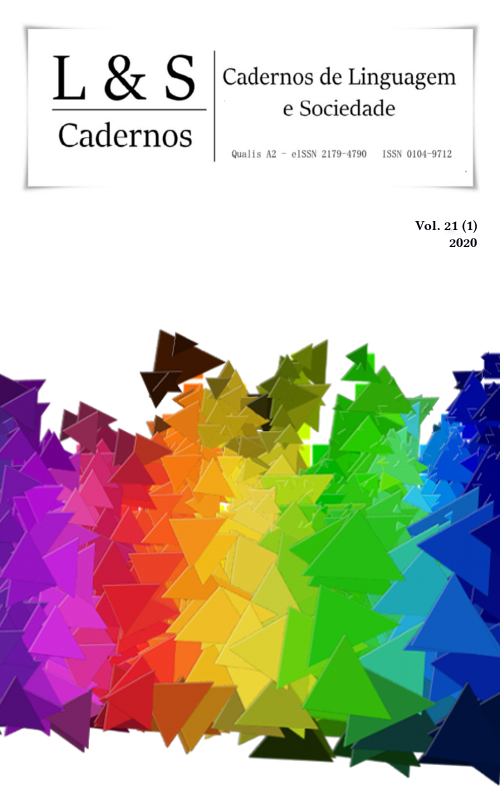DESCONSTRUINDO A COLONIALIDADE DO IMAGINÁRIO DEMOCRÁTICO CENTRADO NO OCIDENTE
DOI:
https://doi.org/10.26512/les.v21i1.30389Palavras-chave:
Análise Crítica do Discurso , Democratização , Neoliberalismo , Neocolonialismo , UcrâniaResumo
Muitos estudiosos de Análise Crítica do Discurso assumem que há uma oposição inerente entre democratização, com seus avanços em direção à justiça social, e mercantilização neoliberal, com sua gama de consequências negativas. Analisando o discurso da democratização no contexto da Ucrânia contemporânea, este artigo argumenta que a questão é mais complicada. A mercantilização neoliberal pode andar de mãos dadas com o discurso da democratização universal, o que apenas contribui, portanto, para a perpetuação da injustiça neocolonial, tal como ela se manifesta nos projetos neoliberais em andamento
Downloads
Referências
ASCIONE, G. Decolonizing the ‘global’: the coloniality of method and the problem of the unit of analysis. Cultural sociology, v. 10, n. 3, p. 1-18, 2016.
BAYSHA, O. The mythologies of capitalism and the end of the Soviet project. Lanham, MD: Lexington, 2014.
BAYSHA, O. In the name of national security: articulating ethno-political struggles as terrorism. Journal of multicultural discourses, v. 14, n. 4, p. 332-48, 2017.
BAYSHA, O. Miscommunicating social change: lessons from Russia and Ukraine. Lanham, MD: Lexington, 2018a.
BAYSHA, O. Synecdoche that kills: how Barack Obama and Vladimir Putin constructed different Ukraines for different ends. International Communication Gazette, v. 80, n. 3, p. 230-49, 2018b.
BOYD-BARRETT, J. O. Western mainstream media and the Ukraine crisis: a study in conflict propaganda. London: Routledge, 2017.
BRUCE, I. Resisting neoliberalism through political and social critique: the Guardian column of Polly Toynbee. Discourse, Context & Media, v. 10, p. 45-52, 2015
DEAN, J. Democracy and other neoliberal fantasies. Durham & London: Duke University Press, 2009.
DECLARATION. Joint declaration of the Eastern Partnership Summit. Council of the European Union, 29 November, 2013. Available at: https://www.consilium.europa.eu/media/31799/2013_eap-11-28-joint-declaration.pdf. Accessed on: 29 May, 2020.
DERRIDA, J. Who’s afraid of philosophy: right to philosophy. Stanford, CA: Stanford University Press, 2002.
FAIRCLOUGH, N. Discourse and social change. Cambridge: Polity Press, 1992.
FAIRCLOUGH, N. Media discourse. London, New York: Edward Arnold, 1995.
FAIRCLOUGH, N. Analyzing discourse: textual analysis for social research. New York: Routledge, 2003.
FAIRCLOUGH, N. Language and globalization. New York: Routledge, 2006.
FAIRCLOUGH, N. Critical discourse analysis: the critical study of language. New York: Routledge, 2013.
FAIRCLOUGH, N. A dialectical-relational approach to critical-discourse analysis in social research. In: WODAK, R.; MEYER, M. (org.). Methods of critical discourse studies. London: SAGE, 2015a.
FAIRCLOUGH, N. Language and power. New York: Routledge, 2015b.
GARNHAM, N. The media and the public sphere. In: CALHOUN, C. (org.). Habermas and the public sphere. Cambridge, MA: MIT Press, 1992.
GUARDINO, M. Neoliberal populism as hegemony: a historical-ideological analysis of US economic policy discourse. Critical Discourse Studies, v. 15, n. 5, p. 444-62, 2018.
GÜVEN, F. Decolonizing democracy: intersections of philosophy and postcolonial theory. Lanham, MD: Lexington, 2015.
HABERMAS, J. The postnational constellation: political essays. Cambridge, MA: MIT Press, 2001.
JÄGER, S.; MAIER, F. Analysing discourses and dispositives: a foucauldian approach to theory and methodology. In: WODAK, R.; MEYER, M. (eds.). Methods of critical discourse studies London: SAGE, 2015.
JUSKA, A.; WOOLFSON, C. The moral discourses of ‘post-crisis’ neoliberalism: a case study of Lithuania’s Labour Code reform. Critical Discourse Studies, v. 14, n. 2, p. 132-49, 2017.
LACLAU, E. On populist reason. New York: Verso, 2005.
LACLAU, E. The rhetorical foundations of society. New York: Verso, 2014.
MCCARTHY, T. Race, empire, and the idea of human development. Cambridge, MA: Cambridge University Press, 2010.
PHILIPS, L.; JØRGENSEN, M. Discourse analysis as theory and method. London: SAGE, 2002.
POWER, M. et al., Reasonable people vs. the sinister fringe: Interrogating the framing of Ireland's water charge protestors through the media politics of dissent. Critical Discourse Studies, v. 13, n. 3, p. 261-77, 2016.
RUTHERFORD, J. The third place: interview with Homi Bhabha. In: RUTHERFORD, J. (ed.). Identity, community, culture, difference. London: Lawrence & Wishart. 1990.
SAKWA, R. Frontline Ukraine: crisis in borderlands. London; New York: I. B. Tauris, 2015.
SNYDER, T. The road to unfreedom: Russia, Europe, America. New York: Tim Duggan Books, 2018.
QUIJANO, A. Coloniality of power and Eurocentrism in Latin America. International sociology, v. 15, n. 2, p. 215-32, 2000.
SAID, E. W. Orientalism. NY: Pantheon Books, 1979.
STEGER, M. Globalism: Market ideology meets terrorism. Lanham: Rowman and Littlefield, 2005.
STIGLITZ, J. E. Globalization and its discontents. New York; London: W.W. Norton & Company, 2003.
TAYLOR, C. Sources of the self: the making of the modern identity. Cambridge, MA: Harvard University Press, 1992.
VAN DIJK, T. A. Critical discourse studies: a sociocognitive approach. In: WODAK, R.; MEYER, M. (ed.). Methods of critical discourse studies. London: SAGE, 2015. p. 62-85.
WODAK, R.; MEYER, M. Critical discourse studies: history, agenda, theory and methodology. In WODAK, R.; MEYER, M. (ed.) Methods of critical discourse studies. London: SAGE, 2015., p. 1-22.
YURCHENKO, Y. Ukraine and the empire of capital: From marketization to armed conflict. London: Pluto Press, 2018.
Downloads
Publicado
Como Citar
Edição
Seção
Licença
Copyright (c) 2020 Cadernos de Linguagem e Sociedade do Programa de Pós-Graduação em Linguística da UnB é licenciado sob uma Licença Creative Commons Atribuição-Uso não-comercial-Vedada a criação de obras derivadas 3.0 Unported.

Este trabalho está licenciado sob uma licença Creative Commons Attribution 4.0 International License.
Autores/as que publicam nesta revista concordam com os seguintes termos:
Autores/as mantêm os direitos autorais e concedem à revista o direito de primeira publicação, sendo o trabalho simultaneamente licenciado sob a Creative Commons Attribution 4.0 International license que permite o compartilhamento do trabalho com reconhecimento da autoria do trabalho e publicação inicial nesta revista.



